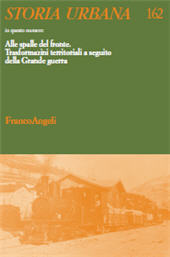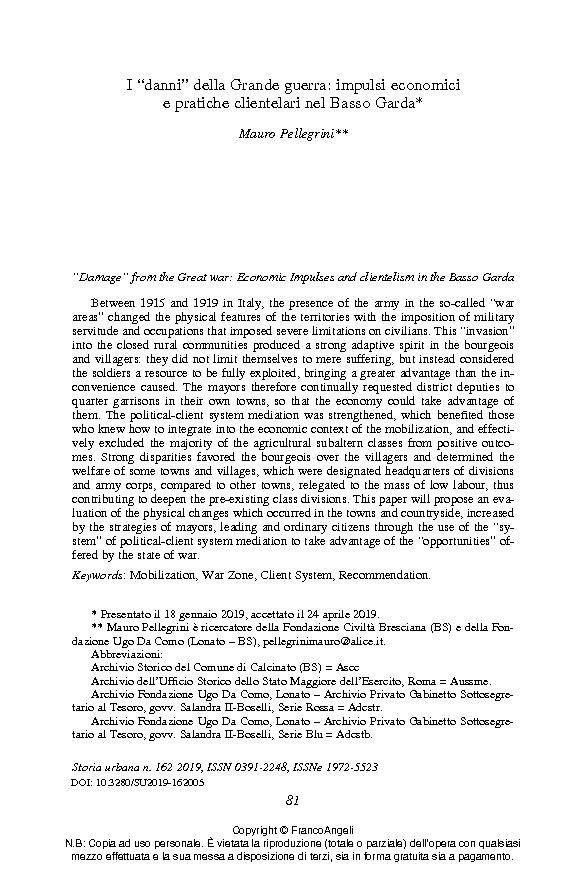I danni della Grande guerra : impulsi economici e pratiche clientelari nel Basso Garda
81-112 p.
Tra il 1915 ed il 1919 in Italia, la presenza dell'esercito nella Zona di Guerra modificò l'aspetto fisico del territorio con l'istituzione delle servitù militari e delle occupazioni che imposero severe limitazioni ai civili. L'"invasione" del limitato orizzonte delle comunità rurali produsse in borghesi e paesani uno spiccato spirito adattivo: essi non si limitarono a subire, ma considerarono i militari a tutti gli effetti una risorsa da sfruttare, portatrice di un vantaggio maggiore del disagio arrecato. I sindaci richiesero perciò incessantemente ai deputati circoscrizionali accantonamenti di guarnigioni nei loro paesi, affinché l'economia potesse trarne beneficio. Si rafforzò la mediazione politico clientelare, che avvantaggiò chi seppe inserirsi nel contesto economico della mobilitazione, ed escluse di fatto la maggioranza dei ceti subalterni agricoli da ricadute positive.
Il saggio analizza le modificazioni fisiche verificatesi in borgate e campagne del Basso Garda, caratterizzato da forte espansione industriale entro un'economia agraria ancora prevalente, generate dalle strategie di sindaci, notabili e semplici cittadini attraverso il ricorso al "sistema" di mediazione politicoclientelare per profittare delle "opportunità" offerte dallo stato di guerra. [Testo dell'editore].
Between 1915 and 1919 in Italy, the presence of the army in the socalled "war areas" changed the physical features of the territories with the imposition of military servitude and occupations that imposed severe limitations on civilians. This "invasion" into the closed rural communities produced a strong adaptive spirit in the bourgeois and villagers: they did not limit themselves to mere suffering, but instead considered the soldiers a resource to be fully exploited, bringing a greater advantage than the inconvenience caused. The mayors therefore continually requested district deputies to quarter garrisons in their own towns, so that the economy could take advantage of them. The politicalclient system mediation was strengthened, which benefited those who knew how to integrate into the economic context of the mobilization, and effectively excluded the majority of the agricultural subaltern classes from positive outcomes.
Strong disparities favored the bourgeois over the villagers and determined the welfare of some towns and villages, which were designated headquarters of divisions and army corps, compared to other towns, relegated to the mass of low labour, thus contributing to deepen the preexisting class divisions. This paper will propose an evaluation of the physical changes which occurred in the towns and countryside, increased by the strategies of mayors, leading and ordinary citizens through the use of the "system" of politicalclient system mediation to take advantage of the "opportunities" offered by the state of war. [Publisher's text].
Ist Teil von
Storia urbana : rivista di studi sulle trasformazioni della città e del territorio in età moderna : 162, 1, 2019-
Artikel aus derselben Ausgabe (einzeln erhältlich)
-
Informationen
ISSN: 1972-5523
THEMENBEREICHE
KEYWORDS
- Garda, Mobilitazione, Zona di Guerra, Sistema, Clientelare, Raccomandazione
- Mobilization, War Zone, Client System, Recommendation



